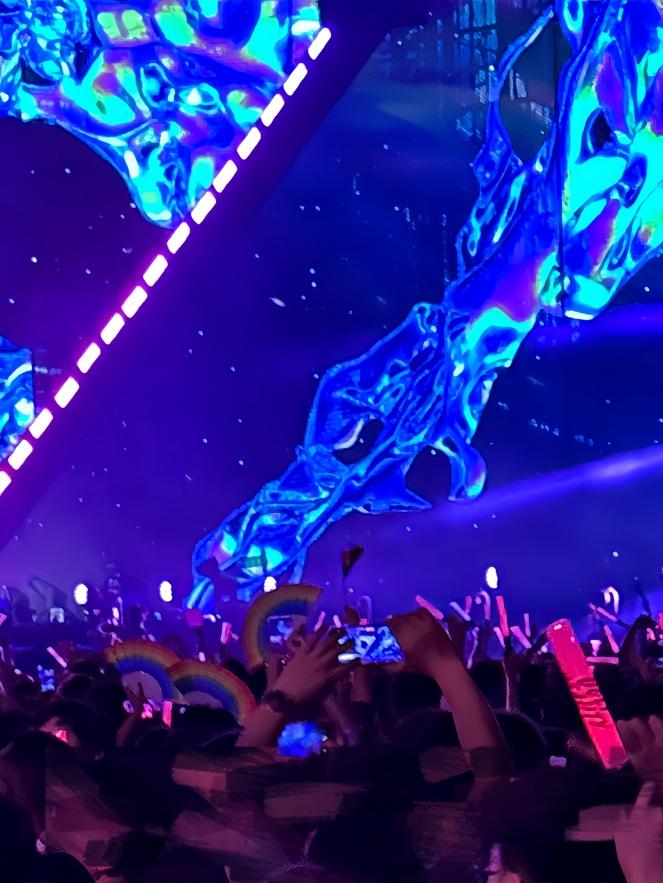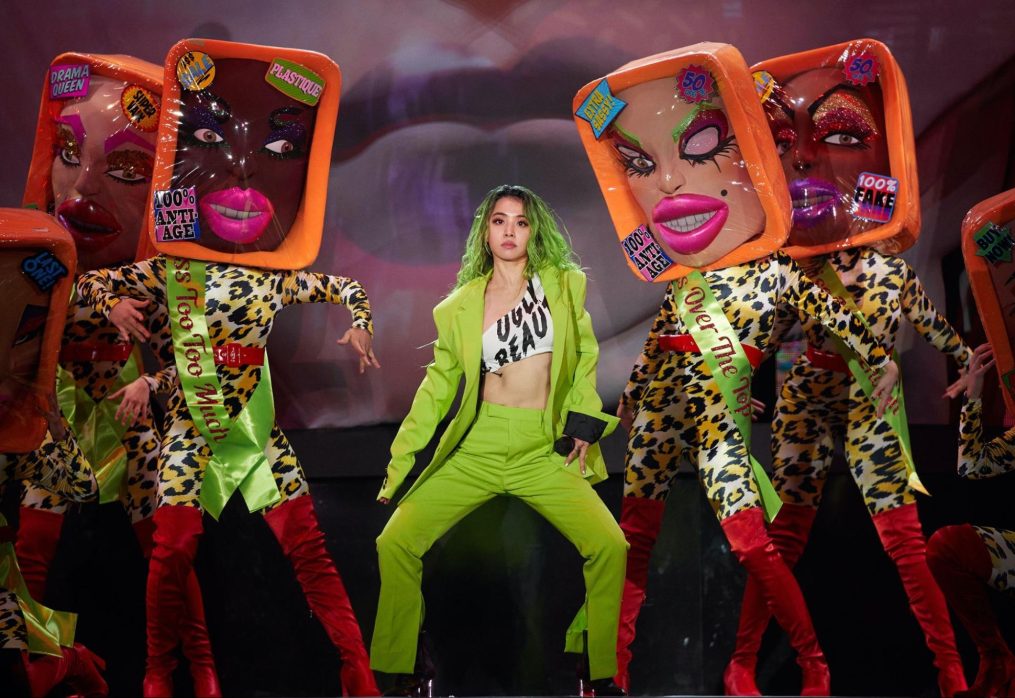How a Taiwanese singer’s concerts became a ‘queer party’ in China
But what made the show truly unique was the abundance of rainbow symbols in the stadium. Some in the audience had temporary rainbow tattoos on their faces and arms, while others held rainbow-colored fans. Outside the venue, there were several hawkers selling rainbow flags.

In many ways, the presence of rainbow imagery in Tsai’s concert should not come as a surprise. The Mandopop icon is a longtime LGBTQ ally, with a music career that consistently gives representation to LGBTQ people. In 2014, for example, Tsai released a single titled “We’re All Different, Yet the Same” to celebrate same-sex love. Her 2018 song “Womxnly,” which advocates for diverse gender expressions, has been hailed as an empowering anthem among Chinese-speaking queer communities.
Tsai isn’t the only Taiwanese celebrity who enjoys a huge queer fan base in mainland China. Having been the first ambassador for Taiwan Pride in 2007, Zhāng Huìmèi 张惠妹, better known by her stage name, A-Mei, is also considered to be a queer icon among mainland LGBTQ people for her outspokenness on queer issues.
“This connection travels across the strait,” Ricky, a China-based researcher with a focus on Chinese queer cultures, explained to The China Project. “In mainland China, their concerts provide a rare opportunity for queer people to gather and celebrate who they are.”
But as Chinese officials tighten censorship over LGBTQ-related expressions, A-Mei and Tsai’s recent mainland tours weren’t as gloriously gay as many hoped they would be. After Tsai’s first stop in Guangzhou, the iconic lighting arrangement of her tour, which bathes the whole stadium in rainbow lights during the performance of “Womxnly,” was canceled with no explanation. When A-Mei performed in Beijing in August, some audience members wearing rainbow-colored shirts were reportedly stopped by security guards and asked to change before entering the venue.
Within this context, the prominence of rainbow symbols in Tsai’s Shenzhen concert shows both the inconsistency of Chinese governance, which could differ from city to city, and the resilience of queer voices in an increasingly hostile political environment.
The making of a gay icon
Tsai’s popularity among mainland Chinese queer communities stems not only from her LGBTQ advocacy, but also from her reputation as a subcultural icon.
Linki, a Chinese gay man who has been a Jolin Tsai fan for more than a decade, is part of a lively Tsai-centered subculture known as “Linguage” (淋语 línyǔ), which started in 2010 as a parody of Tsai’s Taiwanese and English accents.
Despite its origin as mockery, this particular way of talking — for instance, adding “re” (惹 rě) to the end of a sentence or saying “jiumi” (啾咪 jiūmī) to play cute — has gained popularity among gay communities in mainland China, and is still widely used to this day.
An active daily user of Linguage himself, Linki sees the wide adoption of Linguage as a reflection of “a subcultural group’s struggles against authority, hegemony, and dogma,” he told The China Project. “You sound sarcastic and bitchy when you speak Linguage. But at least you are expressing your true opinions. This challenges the Chinese officials’ discursive hegemony.”
For Tsai, the mockery initially negatively affected her career. But she was able to move past it thanks to her versatility and constant self-reinvention.
When she started her career at the age of 19, Tsai was known as a girl-next-door teen idol. But with her third album, Magic (2003), the singer started to make dance-oriented music, transforming herself into — to borrow the title of her 2006 hit single — a “Dancing Diva.”
In 2009, Tsai founded her own music production company and started to take full control of her career. Since then, she became more involved in public issues, with her music also becoming more vocal about gender and sexual politics. In 2012, Tsai signed a petition for legalizing same-sex marriage in Taiwan, while continuing to raise awareness about issues of gender and sexuality in her songs and concerts.
“Tsai’s stardom shows that it is possible to always go beyond oneself. She was seen as only mediocre when she started, but over time she defeated all skepticism and emerged as a strong, independent diva,” Ricky said. “This story of enduring hardship and becoming someone extraordinary resonates strongly with queer communities.”
He added: “In mainland China, queer fans embrace her because they know about her role in queer activism in Taiwan. Their support also reflects an aspiration for queer visibility and marriage equality. In this sense, attending a Jolin Tsai concert has a political connotation as well.”
Back to reality
While many Chinese LGBTQ people find it liberating and empowering to party with others in the community at their favorite queer-friendly artists’ shows, there is still very real politics for them to navigate outside concerts.
In an age of soaring nationalism and ubiquitous censorship, Taiwanese celebrities, including Jolin Tsai and A-Mei Chang, are under heightened scrutiny from both officials and nationalistic netizens in mainland China, where they are expected to toe the Party line — or risk losing their career here.
In 2021, Tsai was rumored to be on the Chinese officials’ blacklist of “tainted celebrities” because of her allegedly “ambiguous” attitude on the issue of Taiwan unification. In 2022, on the night of U.S. House Speaker Nancy Pelosi’s visit to Taiwan, Tsai lost more than 300,000 followers on Weibo for failing to repost a “One China” statement published by China Central Television, the country’s state-owned broadcaster.
When asked about what Tsai’s mainland concerts could mean for LGBTQ politics in the region, Linki said that his fellow gay fans need to be less idealistic and more attuned to the reality.
“I don’t think divas such as Jolin Tsai and A-Mei Chang are catering to a queer audience just for the money, but I do think there are commercial interests involved,” he said. “Once you gain recognition from queer communities, they will support you through consumption. And this is what’s happening: queer people using consumption as a means to defend their stance and rights to self-expression.”
“We should remember that Jolin Tsai is, after all, part of the commercial entertainment industry. She’d be safe and free after the concerts as long as she doesn’t step out of the line,” Linki added, stressing that things are different for ordinary people.
“You don’t become Jolin Tsai after attending one concert. You have to come back to your job, your family, and your limited space of expression. You could still be bullied and oppressed in this society that is growing more conservative by the day,” he said. “So once the concert is finished, we need to keep a cool head so that we can think about how to better protect ourselves.”
Other LGBTQ stories this week:
Jihua Rainbow holds online memorial for deceased LGBTQ people (WeChat)
On August 30, China’s Ghost Festival, Jihua Rainbow, a self-media outlet focusing on LGBTQ public welfare, opened a page on WeChat to hold an online memorial for LGBTQ people who passed away due to bullying, discrimination, and social pressure.
More LGBTQ public accounts removed on WeChat (@estro_femme on Twitter)
WeChat has shut down another batch of LGBTQ-focused public accounts, citing their alleged violations of “relevant laws and regulations.” Among the affected are accounts devoted to China’s transgender and asexual communities.
Queer China is our fortnightly roundup of news and stories related to China’s sexual and gender minority population.


